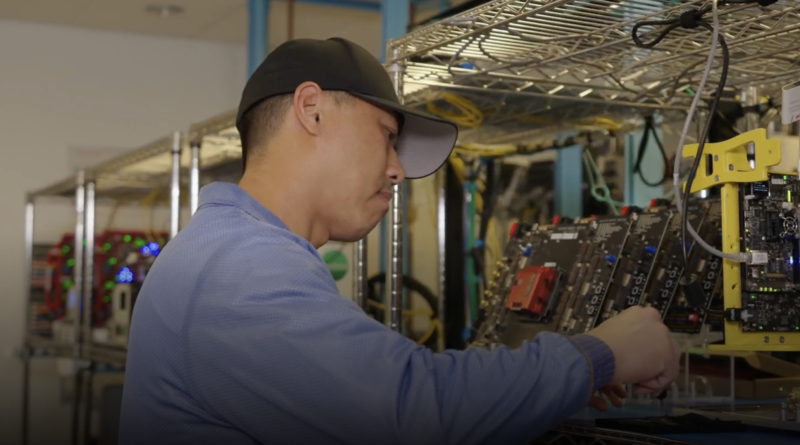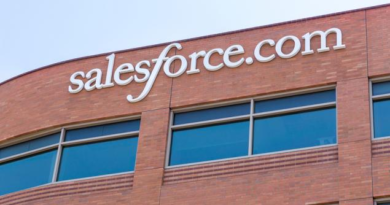Take a rare look inside Apple silicon lab – Cult of Mac
By David Snow •
Apple showed off its Apple silicon lab to media for the first time recently, allowing unusual access along with video interviews with executives about Cupertino’s major chipmaking strides in recent years, culminating in the current M3 series.
“One of the most, if not the most, profound change at Apple, certainly in our products over the last 20 years, is how we now do so many of those technologies in-house,” Apple’s Senior Vice President of Hardware Engineering John Ternus said in one interview.
CNBC journalist Katie Tarasov went inside the Apple silicon lab at Apple Park in Cupertino, one of numerous processor labs Apple operates around the world. You can watch the long video here.
“There’s a simple room filled with a couple hundred machines, blinking lights, a handful of engineers and lab coats, and a bunch of postage stamp-sized chips being put through rigorous testing,” she said, describing the operation.
She first meets with Godfrey D’Souza, senior director of hardware validation at Apple.
“Our goal is to be able to find bugs, manufacturing issues, design issues,” he said, walking among stacks of machines. “We want to find them so we can fix them and address them before we ship our chips into our systems.”
From there, the report revisits Apple’s explosive growth in recent years, thanks in part to it taking ownership of M-series chipmaking from former partners like Intel. Apple deployed its own chips across devices, spurring competitors like Intel and even the likes of Microsoft, Amazon and Tesla to try to catch up.
Tarasov interviewed Ternus and Apple SVP of Hardware Technologies Johny Srouji, who joined Apple in 2008, for the video.
“I came to Apple with the purpose of building our own silicon for the iPhone,” Srouji said. “It was a very small team at the time, about 40 to 50 engineers, and since then we have grown the team immensely. We have thousands of engineers [now]. But if you look at the portfolio of chips we do: very lean, actually. Very efficient.”
Apple’s not a chip-selling company, per se, and that has advantages.
“Because we’re not really selling chips outside, we focus on the product,” Srouji said. “That gives us freedom to optimize, and the scalable architecture lets us reuse pieces between different products.”
Apple developed its chipmaking prowess in part through acquisition. Just a month after Srouji arrived, Apple bought PA Semiconductor for $278 million.
That led to the then-new A4 chip appearing in iPhone 4 and the first iPad in 2010. Then, over time, Apple silicon expanded to more products.
“We built what we call the unified memory architecture that is scalable across products,” said Srouji. “We built an architecture that you start with the iPhone, but then we scaled it to the iPad and then to the watch and eventually to the Mac.”
Apple’s silicon team grew from dozens of engineers to thousands in labs all over the world, including Austria, Germany, Japan, Israel, the U.K. and U.S. facilities in Cupertino, San Diego and Austin, Texas.
Apple mainly works on the chip type known as SoC, or system on a chip. That includes a central processing unit (CPU), graphics processing unit (GPU) and more, like Apple’s neural processing unit (NPU), which Apple calls the Neural Engine.
And while Apple has broken free from relying on others to make its chips, it still relies heavily on just one company, Taiwan Semiconductor Manufacturing Company, for its chips. That will include chips made at TSMC’s new Arizona plant. But at least a new deal with a company called Amkor will ensure chips are fully American made, with no need for shipment to Taiwan during the process.
The CNBC report also touches on Apple’s reported struggles in developing its own 5G modem, though naturally, Srouji declined to comment about the company’s future projects, other than to say it has “teams enabling that.”
Daily round-ups or a weekly refresher, straight from Cult of Mac to your inbox.
Our daily roundup of Apple news, reviews and how-tos. Plus the best Apple tweets, fun polls and inspiring Steve Jobs bons mots. Our readers say: "Love what you do" — Christi Cardenas. "Absolutely love the content!" — Harshita Arora. "Genuinely one of the highlights of my inbox" — Lee Barnett.
The week's best Apple news, reviews and how-tos from Cult of Mac, every Saturday morning. Our readers say: "Thank you guys for always posting cool stuff" — Vaughn Nevins. "Very informative" — Kenly Xavier.


